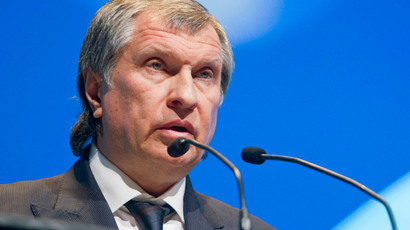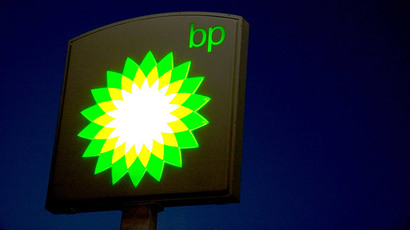Shell tells Putin gas project not derailed by Ukraine
Royal Dutch Shell’s new CEO Ben Van Beurden met with Russian President Vladimir Putin on Friday, signaling Ukraine tension has not affected investment in Russia, and that energy contracts won't be derailed by international politics.
Chief executive Van Beurden met with the president at his residence outside of Moscow and reaffirmed the company’s commitment to develop Russia’s only liquefied natural gas (LNG) plant with Gazprom.
"We also know that this is going to be a project that will need strong support to succeed. So one of my purposes of meeting with you, Mr. President, is to also secure support for the way forward on this project," Van Beurden said.
“Now is the time to expand this lucrative project, we will need strong support to make it a success,” the oil chief said.
Putin said he was happy that Shell is continuing its work in Russia.
The Anglo-Dutch multinational oil and gas company has several ongoing hydrocarbon projects in Russia, including a 27 percent stake in the Sakhalin 2 project, the world's biggest oil exploration project, as well as multibillion dollar deals to explore Arctic reserves with state-owned companies Gazprom and Rosneft.
“The cooperation between Russia and Shell and other international oil companies is essential for Russia building up new reserves of oil and gas and remaining the top producer of oil and gas in the world,” Mamdouh Salameh, an oil expert at and World Bank Energy Consultant, told RT.
Ahead in the Arctic
Only Russian state-owned companies can obtain licenses to explore the Arctic’s oil reserves, which are estimated at 90 billion tons, or 13 percent of the world’s supply.
“Shell, like ExxonMobil, has a vested interest Russia’s Arctic areas. Russia is already ahead of its rivals in the Arctic as they are already producing oil,” Salameh said.
Natural gas reserves stand at 1.67 trillion cubic meters, or 30 percent of the world reserves, and liquefied natural gas weigh in at 44 billion barrels, or 20 percent of potential reserves.
Shell, which has various projects in Alaska, can transfer its expertise to the Russian Arctic.
Other gas majors like Italy’s ENI, Norway’s Statoil, US's ExxonMobil, and France’s Total are working with Russian companies to explore oil in Russia’s Arctic.
What sanctions?
Political discord between the West and Russia over Ukraine has led the US to lead sanctions against Russia, which could have adverse affects for Western companies working in the country’s oil and gas industry.
“I’m sure they will be subject to some pressure if any sanctions are imposed on Russia, but I doubt they will succumb to that,” Salameh said.
Despite the US being the most vocal about enforcing sanctions, the biggest US oil company, ExxonMobil, has the largest geographical presence in Russia.
For oil execs, business continues as usual in Russia. Speaking at BP’s annual shareholder meeting last week, CEO Bob Dudley remained positive about joint ventures with Russia.
BP owns a 19.75 percent stake in Rosneft as a result of the mega-merger between the state company and TNK-BP in March 2013.
Unlike other foreign oil companies in Russia, Shell has minimized its exposure to Russia by investing project-by-project, instead of buying a stake in domestic companies.














